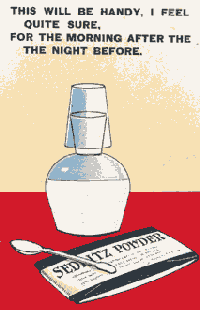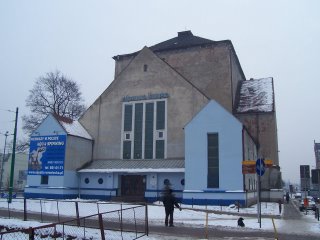Tuesday, January 31, 2006
millennial
Geoffrey Hartman, in the course of a lecture of 2000 called 'Life and Learning', responds:
'It would seem to me that we already have world enough, though not time enough, and that passage from 'you will be able to store and retrieve it' to 'and do what you will with it' is far more questionable than that easy, consequential 'and' suggets. Taylor elides the moral problem of the use to which knowledge will be put, especially in an age of information technology. For what is lacking and difficult to increase is studium, the capacity to think and interpret, which discovers the curvature of space or of expression, and accepts that, if 'all's oblique,' we can never coincide entirely with ourselves, or a presumed identity.'
Sunday, January 29, 2006
pod of whales
Pilot whale doing the do. Or, more technically, an overture.
Here's another.
(they were tucked away here)
Thursday, January 26, 2006
The 1930s
 Maybe there is an argument for a separate Empson blog. 'The stock device of the play [The Beggar's Opera] is a double irony like a Seidlitz powder, piling a dramatic irony onto what was already an irony. This forces one to read back a more complex irony onto the first one, and the composure of language of the characters makes us feel that the speaker took the whole sense for granted. So he is a pastoral character; he moves among fundamental truths.'
Maybe there is an argument for a separate Empson blog. 'The stock device of the play [The Beggar's Opera] is a double irony like a Seidlitz powder, piling a dramatic irony onto what was already an irony. This forces one to read back a more complex irony onto the first one, and the composure of language of the characters makes us feel that the speaker took the whole sense for granted. So he is a pastoral character; he moves among fundamental truths.'Seidlitz powder, the Pharmaceutical Journal tells us, was thought to help treat, among other things, the 'oedematous tumours of the legs in literary men'.
Wednesday, January 25, 2006
Tuesday, January 24, 2006
february's quiz
These are the first lines of 'The Fire Sermon' from that poem 'The
Waste Land' by T S Eliot.
"The river's tent is broken: the last fingers of leaf
Clutch and sink into the wet bank."
Can anybody explain what the word 'tent' is up to?
Empson soup
I might get a mid-day phone-call: 'Jones, I have a young poet coming
to lunch. I'd be very glad of your support.' I would find him in the
kitchen in the fawn dressing-gown which he habitually wore over his
clothes as a comfortable house-coat, busily making last-minute
preparation and turning a mess in a saucepan. This was 'Empson soup',
a dish which almost defies description. It was concocted from a Heinz
tin, to which was added sundry left-overs of vegetables he had tucked
away in corners of the fridge, plus the left-overs of yesterday's
soup, so that one day's soup would not be noticeably different from
the next. There was a large quantity of solids – butterbeans, chunks
of celery, slabs of cabbage and bits of boiled egg, and much reduced
and recycled gunge, but one would not have been surprised to find
anything in it, even false teeth. You could not stir it, you could
only turn it over. He ate it every day and Hetta maintained it was the
cause of his ulcer.
John Henry Jones, 'Diary', LRB 17 August 1989
Monday, January 23, 2006
uncanny
My encircler, I am placing a lock
upon my lips, though nine deaths
were in my unhemmed mouth
or thy mouth breast-white to my breast.
The tongue and knot and pulsing oil
of death without death goes round
in a thread, so I see neither the black
nor the white, tonight, in the upper chamber:
only the knee-woman, the world-woman,
the woman of songs.
Medbh McGuckian
Sunday, January 15, 2006
why is the panel on the right there a bit jiggered of late?
The Witches of Eastwick (1984)
Thursday, January 12, 2006


Alan's first post (thanks to Madzia for showing me her city!):
In my mind, the prime attraction of Poznan is it's fantastic multimedia history show, 'Makieta Dawnego Poznania', including flashy lights and fires-made-out-of-coloured-handkerchiefs-and-a-wind-machine (http://www.makieta.poznan.pl/). The commentary is available in several European languages, though, as the ladies selling the tickets told us, the German version is hardly ever requested. We weren't very surpised about this after we'd seen the show, as the commentary was so anti-German that its German version might as well have been called 'wszystko przez Was'.
You also get to dress up at the Makieta!
Another interesting place in Poznan: the former synagogue, aka the swimming pool.
ought one to encourage cheese?
Closely Observed Trains
Friday, January 06, 2006
Tuesday, January 03, 2006
someone else's diary
'Reading Frank Kermode's review of John Haffenden's life of Empson makes me regret a little that Empson was cut out of The History Boys. In the first version of the play Hector sings the praises of Sheffield where he had been taught by Empson, then recounts to the boys wanting to go to Cambridge the circumstances of Empson's downfall at Magdalene. 'So when you say Cambridge University to me, I say to you "A prophylactic in the wardrobe"' - this last delivered like a war-cry. Empson was not the only casualty in the play. Simone Weil got the boot, as did Nina Simone and Simone Signoret, Jowett (of Balliol fame), James Agate, Jane Austen, Molly Bloom, Hegel and Henry James, all of them biting the distinguished dust.'
(from the LRB)



